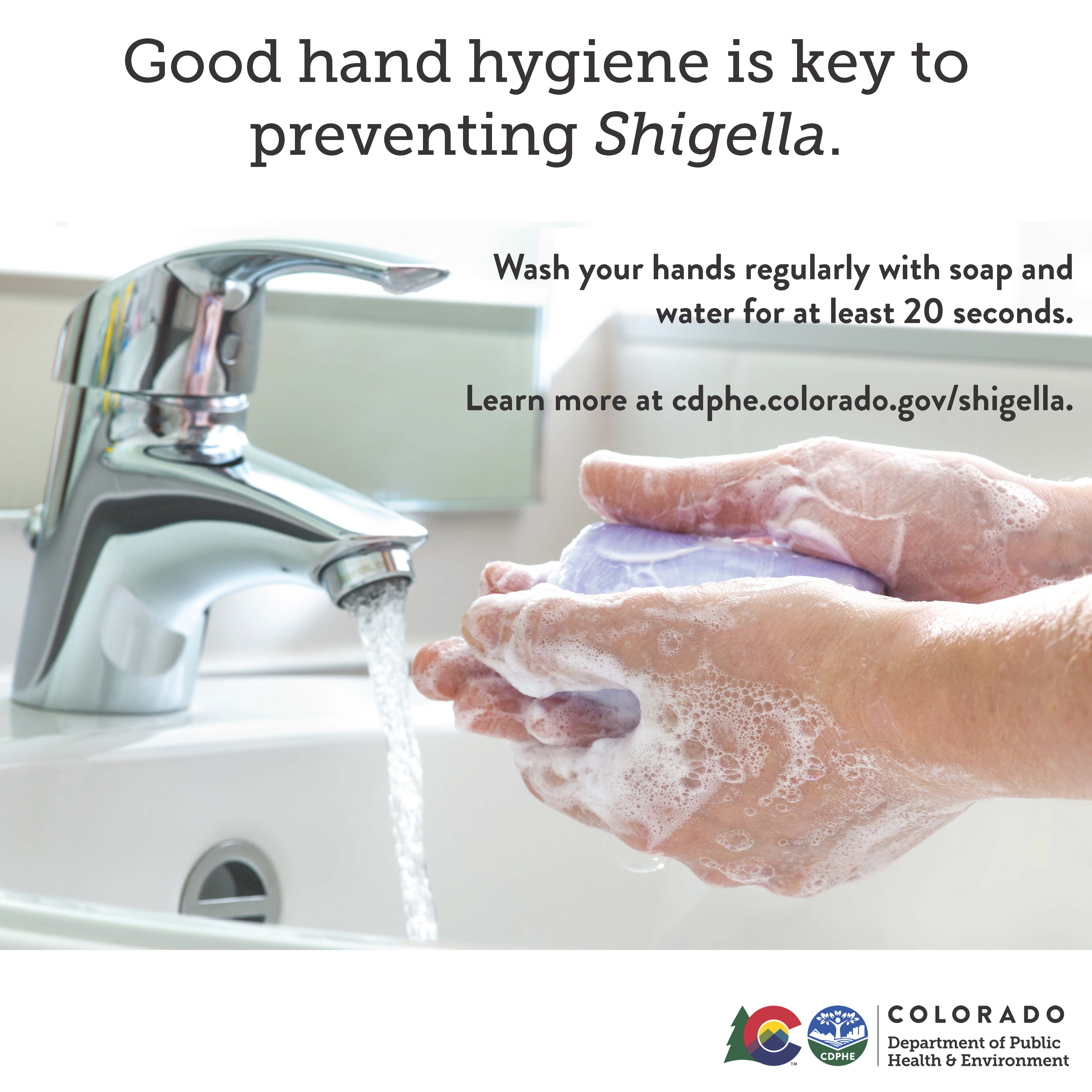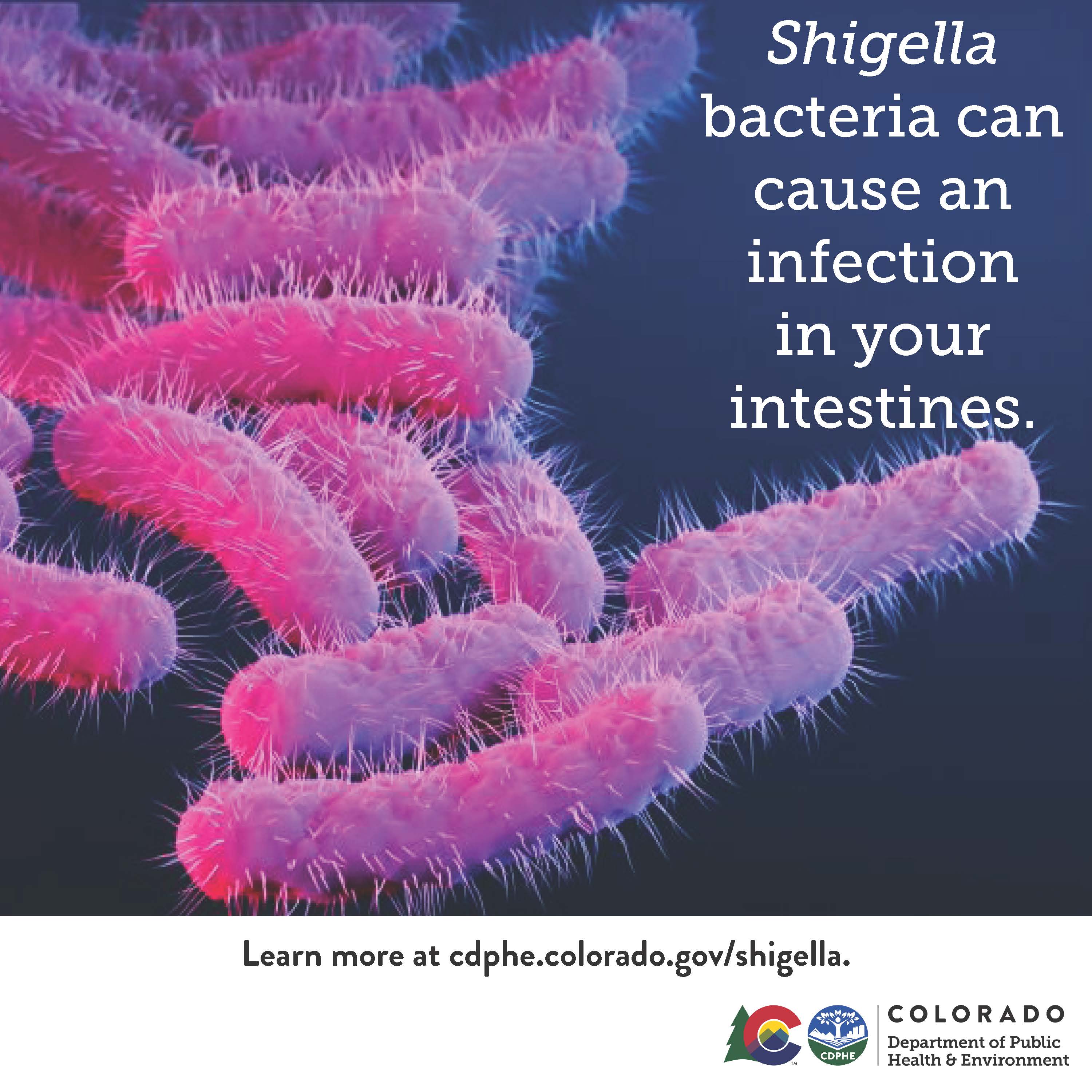Shigella
Shigella communications toolkit for sexually active Coloradans
Last updated: August 2, 2024
Use this toolkit to communicate with your audience about Shigella prevention.
Sample newsletter
Shigella is on the rise in Colorado. Shigella is a bacteria that can cause stomach illness. Since the start of 2024, more than 200 cases of Shigella illness among adults have been reported. The most common risk factor in Colorado is recent sexual activity.
Most people with Shigella have diarrhea that can be bloody, a fever, stomach pain, or feeling the need to pass stool even when the bowels are empty. Symptoms usually start one to two days after exposure and last seven days.
Shigella can spread easily if someone swallows the bacteria. Shigella can get in your mouth from your hands by:
- Touching surfaces, such as sex toys and bathroom fixtures, contaminated with Shigella bacteria.
- Getting exposed to stool (poop) during sex with someone who has Shigella or has recently recovered from it.
- Taking care of a person with Shigella, including cleaning up after the person uses the toilet.
If you are diagnosed with Shigella, help protect those around you.
- Wash your hands carefully and frequently with soap and water for at least 20 seconds, especially after using the bathroom. If soap and water are not available, use an alcohol-based hand rub.
- Do not prepare food for others while you are sick. After you get better, wash your hands carefully with soap and water before preparing food for others.
- Stay home from work in food service, health care, or child care until you've spoken to public health. Refer to your local health department’s website for more information.
- Avoid swimming until you have fully recovered.
Waiting to have sex (vaginal, anal, and oral) for two weeks after you no longer have diarrhea is the best way to prevent transmission to your partner(s). If you do choose to have sex, follow the safer sexual practices below:
- Wash your hands, genitals, and anus with soap and water before and after sexual activity.
- Use barriers like condoms, dental dams, and natural rubber latex sheets during vaginal, anal, and oral sex.
- Use latex gloves during anal fingering or fisting.
- Use condoms with sex toys and wash toys between uses. Wash hands after touching sex toys.
If you are experiencing symptoms of Shigella, contact your health care provider. People with mild illness may only need to drink fluids and rest. People who have weakened immune systems due to illness (such as HIV) or medical treatment (such as chemotherapy) can get a more serious illness. A severe Shigella illness can spread into the blood, which can be life threatening. For more information, visit CDC’s Shigella webpage.
Social media
Facebook
Shigella is on the rise in Colorado. Shigella is a bacteria that can cause stomach illness. Good hand hygiene is key to preventing the spread – regularly wash your hands with soap and water for at least 20 seconds.
X (Formerly Twitter)
Shigella is on the rise in Colorado. Shigella is a bacteria that can cause stomach illness. Good hand hygiene is key to preventing the spread - regularly wash your hands with soap and water for at least 20 seconds.
Facebook
Shigella is on the rise in Colorado. Shigella is a bacteria that can cause stomach illness. It can spread easily if someone swallows the bacteria. The most common risk factor in Colorado is recent sexual activity. If you are diagnosed with Shigella, wash your hands regularly with soap and water for at least 20 seconds, do not prepare food for others while you are ill, and avoid having sex for two weeks after your symptoms go away.
X (Formerly Twitter)
Shigella is on the rise in Colorado. Shigella is a bacteria that can cause stomach illness. If you are diagnosed with Shigella, wash your hands regularly, do not prepare food for others while sick, and avoid having sex for two weeks after your symptoms go away.
Facebook
Shigella is on the rise in Colorado. Shigella is a bacteria that can cause stomach illness. It can spread easily if someone swallows the bacteria. People who have Shigella usually get better on their own in five to seven days. While recovering, wash your hands regularly with soap and water for at least 20 seconds to prevent spreading it to others.
X (Formerly Twitter)
Shigella is on the rise in Colorado. Shigella is a bacteria that can cause stomach illness. People who have Shigella usually get better on their own in five to seven days. While recovering, wash your hands regularly to prevent spreading it to others.


